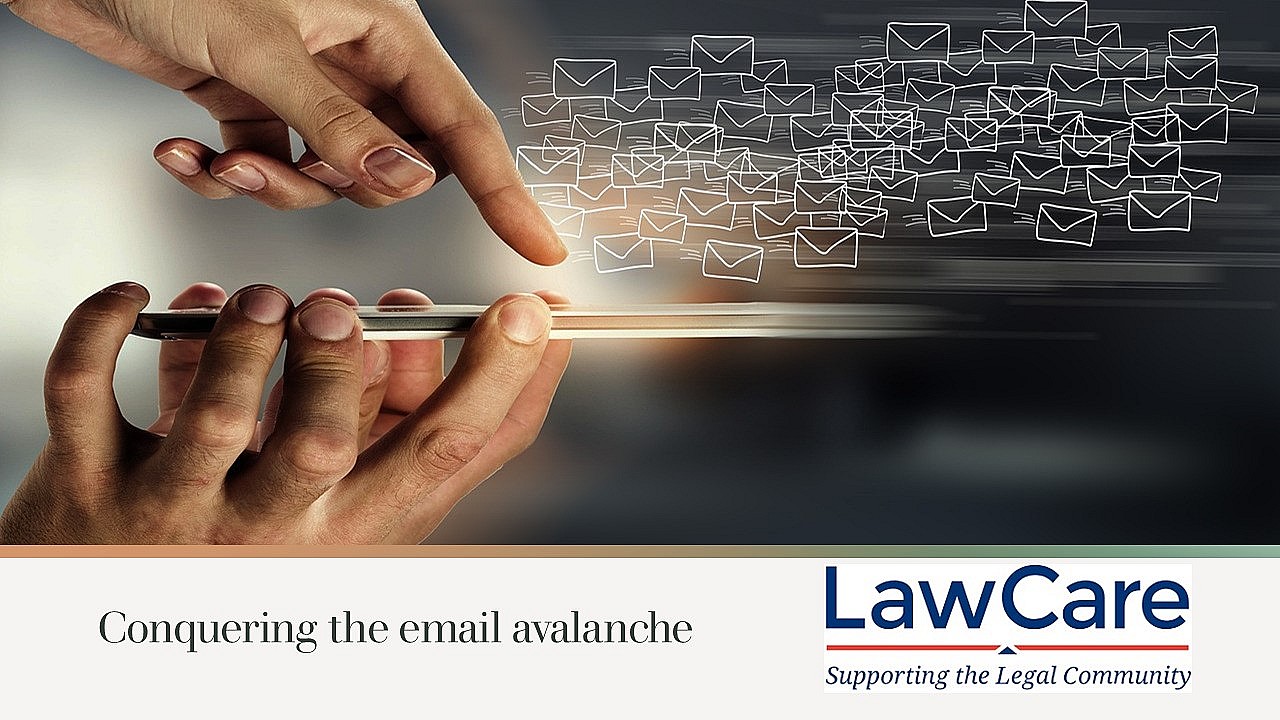
Managing your inbox can feel like a full-time job. The never-ending stream of emails can be overwhelming and stressful, leading to anxiety and burnout from the pressure to respond quickly and stay organised. So why is it so hard to keep up with emails when you work in the legal sector?
Firstly, the sheer volume of emails can be overwhelming; with some emails requiring urgent attention because of deadlines, negotiations, or pressing questions. These emails need prompt and careful responses. Legal emails often contain detailed, complex information that must be thoroughly read and considered to avoid mistakes.
Secondly, there’s such a lot of administrative work involved in legal work. Most people working in the legal sector need to coordinate with other people, each needing different responses and follow-ups. One email can quickly turn into many more emails - an email avalanche. Every email must be carefully documented and filed for future reference to comply with legal standards, adding more work.
Thirdly, frequent interruptions and high workloads make it even harder to keep up with emails. When you are busy it likely that you have very little dedicated time for non-billable tasks like email management. This can result in a backlog of unread emails, or ones you have simply flagged to come back to later.
Tips for keeping your inbox under control
Understanding these challenges can help you simplify your email management, reduce stress, and respond quickly to important messages.
1. Set clear boundaries – You could set specific times for checking and responding to emails, rather than allowing them to interrupt your workflow throughout the day. For instance, checking emails at designated times in the morning, after lunch, and before the end of the day can help manage the influx without constant distractions.
2. Prioritise and categorise - You can use features like flags, labels, or folders to sort emails by urgency and subject matter. This way, you can quickly identify and address the most critical emails first, ensuring that urgent matters are not overlooked.
3. Use filters and rules - These can automatically sort incoming emails into relevant folders can save time. For example, emails from specific people can be directed to designated folders, allowing for easier tracking and follow-up.
4. Manage the inbox size - A cluttered inbox can be overwhelming and counterproductive. Regularly archiving old emails and deleting unnecessary ones helps keep the inbox manageable. Keep your inbox size small by moving emails to appropriate folders or archives, ensuring that only active and pending matters remain in the inbox.
5. Effective subject lines - A well-written subject line helps the recipient understand the email's purpose at a glance and can aid quicker and more efficient communication. It also helps if you need to search for the email again in the future.
6. Keep emails concise - Long, wordy emails can lead to miscommunication and take more time to read and respond to. Focus on the essential information and any required actions.
7. Ask yourself if it needs to be an email – We are all used to sending emails, but sometimes a phone call or Teams chat can be quicker and can save a lot of back and forth of emails.
8. Be careful about who you send emails to - Only include people who really need see them. When replying, avoid using "Reply all" unless everyone needs to see your response. This keeps inboxes less cluttered and helps make sure the right people get the right information.
9. Disable notifications - Constant email notifications can be a significant source of distraction. Turning off non-essential notifications allows you to focus better on the task at hand.
10. Use the 'two-minute rule' - If an email can be responded to in two minutes or less, handle it immediately. This practice, known as the 'two-minute rule', helps prevent minor tasks from accumulating and becoming overwhelming.
11. Set up an out-of-office message and voicemail when you're on holiday - If you're worried about being overwhelmed with emails, ask for important ones to be resent after you return, or consider saying you'll be back a day or two later than you actually are to give yourself time to catch up.
12. Checking emails at home – Again, only do this at set times instead of constantly looking at your inbox. This helps you keep a good balance between work and personal time. When you do check, focus on urgent emails first and save the rest for later. This way, you stay organised and avoid burnout.
As individuals, we can improve how we handle emails by setting clear boundaries, prioritising important tasks, using tools to automate repetitive tasks, and keeping messages concise. These steps can help us stay productive and reduce stress.
Workplaces also play an important role in managing emails and supporting employees' mental health. They should set clear rules, such as limiting emails outside of working hours and avoiding unnecessary "Reply all" messages. Encouraging good email habits helps employees focus on their work without feeling overwhelmed, prevents burnout, improves productivity, and supports a better work-life balance. Overall, good email management is key to creating a supportive and mentally healthy workplace.
LawCare
For more guidance on email management and other mental health and wellbeing tips, visit LawCare's website. LawCare also have a helpline open to anyone working in the legal sector in the UK. It’s free and confidential, and they are there to listen and support you, no matter what you're going through. Call LawCare on 0800 279 6888, email support@lawcare.org.uk or get in touch using the online chat on: www.lawcare.org.uk.
